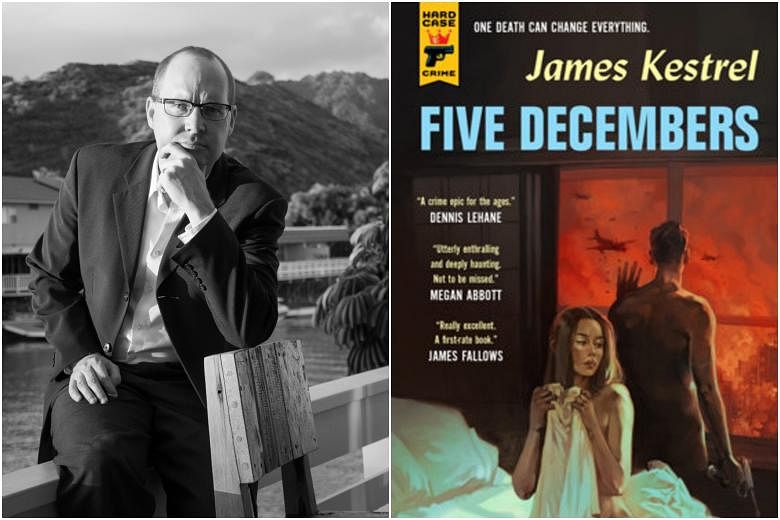Five Decembers
By James Kestrel
Mystery/Hard Case Crime/Hardcover/429 pages/$38.97/Buy here/Borrow here
4 out of 5
Those unfamiliar with the world of noir may be tempted to write off Five Decembers as a seedy third-rate novel when they first see the cover on bookshelves.
Yet the retro pulp art cover - a shirtless man stares out of a bedroom window as bombs light up the sky, while a naked woman sits shyly in the foreground covering her body with a sheet - pays fitting homage to the iconic hard-boiled genre of the 1930s and 1940s.
James Kestrel is the pseudonym of American horror and suspense novelist Jonathan Moore, whose books under his own name include The Poison Artist (2016).
It would be an understatement to call his new novel ambitious.
It is an electrifying thriller set in the Pacific theatre of World War II, with the title a reference to how it spans four years.
The narrative begins in late November 1941, just before the United States is drawn into the war by Japan's surprise attack on Pearl Harbour, and ends after the Japanese surrender in 1945.
At the heart of Five Decembers is hard-boiled Honolulu police detective Joe McGrady, a retired serviceman who is marginalised by his colleagues for not being a born-and-bred local.
He gets assigned to a macabre homicide that quickly takes on fractious political dimensions.
A young American man in his prime and a Japanese woman are found disembowelled in a farmhouse. The man is "split nearly in half, and most of his guts were on the dirt floor". He turns out to be the nephew of a top admiral, but the woman remains unidentified.
The story unfolds in an intricate web of deceit and espionage, as McGrady chases the perpetrator's scent from Hawaii to Guam - where a serviceman is found similarly vivisected - and then to Hong Kong, before he is forcefully taken to Japan during the war.
It is an intense police procedural set in a time when crime-busting relies heavily on the manual combing of records in the absence of databases, and without the benefit of modern forensics.
McGrady is cynical, almost fatalistic, in his dogged years-long hunt for the murderer, yet he never relents, even as his efforts are derailed by the prolonged war and his own growing psychological torment.
Kestrel writes: "He had a handful of promises he didn't know how to keep, and that was it. At least other men had scars. Something they could point to. They'd been in battles that had names."
The story languishes in soppy territory with star-crossed romances that leave McGrady pining. But Kestrel otherwise paints a staggering portrait of the lives affected by war on both sides of the Pacific.
If you like this, read: Tokyo Year Zero by David Peace (Vintage Books, 2008, $26.08, buy here, borrow here). In the first of a trilogy of neo-noir novels based on true-crime events in bombed-out post-war Tokyo, a drug-addicted detective hunts down a serial rapist and murderer who killed several geisha in 1946.


